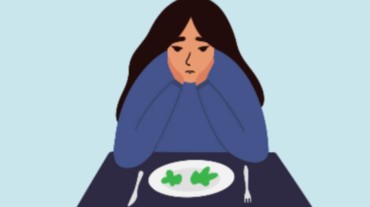
It’s absolutely crazy how we’re all so obsessed with getting perfect bodies these days that anything that involves going easy on yourself and your body might seem absurd. Why do we say this? Well, because aren’t we living in the constant fear of gaining weight and cutting down calories and food—which, by the way is the new “normal”, or so, it seems.
But just to remind you guys, unhealthy eating habits for any reason are what you need to beware of because they might seem like an easy way to lose weight or feel better about yourself, but they can result in some serious health complications.
In fact, you also need to pay close attention to your eating patterns because you could be becoming susceptible to eating disorders. Here, we list seven of those subtle-but-serious eating disorders you need to be paying attention to:
1. Anorexia nervosa
According to the American National Eating Disorders Association (NEDA), this disorder is characterised by extreme weight loss; difficulty in maintaining an appropriate body weight for a particular height, age, and stature; and, in many individuals, distorted body image.
People suffering from this condition could drastically restrict their calorie intake, exercise compulsively, and may try to compensate for eating via forced vomiting or laxatives.

Emotional and behavioural symptoms
Physical symptoms
2. Bulimia nervosa
While anorexia is all about eating less or not eating at all, this one is characterised by repeated episodes of binge eating beyond the point of feeling comfortably full. This is followed by inappropriate behaviour to compensate for the calories gained in binges via self-induced vomiting, misuse of laxatives, fasting, and/or excessive exercise.

Emotional and behavioural symptoms
Physical symptoms
While most physical symptoms like dizziness, fatigue, weight fluctuations, menstrual irregularities, gastrointestinal issues, weak immunity, and deteriorating quality of hair, skin, and nails remain the same as that of anorexia nervosa, certain physical changes might be unique to bulimia.
Select Topics of your interest and let us customize your feed.
PERSONALISE NOW3. Binge eating
The fact that this recently-recognised eating disorder also involves episodes of losing control and eating till you get uncomfortably full, may make it sound like bulimia nervosa. However, in this case, binge eating is not always followed by unhealthy compensatory measures such as forced vomiting and use of laxatives. But, it is surely followed by guilt, shame, and distress.
Symptoms
The physical and behavioural symptoms of the binge eating disorder (BED) are more or less similar to that of bulimia nervosa as both the conditions involve eating beyond necessary.
Also, watch:
4. Orthorexia
The term coined in the 1980s basically indicates an individual’s obsession with proper or ‘healthful’ eating, which often results in them damaging their own well-being instead.
Symptoms
Finally…
Obviously, if you don’t pay heed to the symptoms and seek expert advice and supervision, your condition could get serious and result in nutritional deficiencies and some life-threatening diseases too if matters get out of hand completely.
Get Latest Updates on Mind, Emotional Health, Happiness Hacks, Mental Health